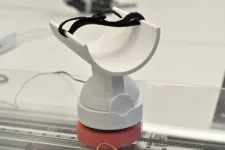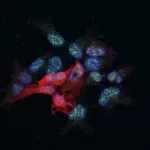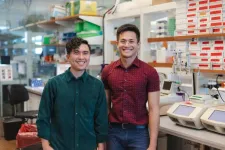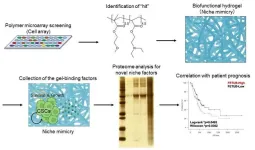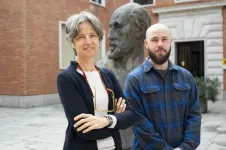(Press-News.org) New URI lab developing adaptive technology, secures National Science Foundation grant
Reza Abiri and Yalda Shahriari receive National Science Foundation award totaling $460,000 for work to improve stroke patient rehabilitation
Passing by Reza Abiri’s office at the University of Rhode Island, one might suspect him of nursing a serious coffee habit. A colorful collection of various mugs and cups dot his office, and though he is friendly enough to likely welcome any visitors stopping by to chat, the cups serve a larger purpose.
Abiri and Yalda Shahriari, professors in URI’s College of Engineering, are building a new robotic platform that can help post-stroke patients perform needed rehabilitation and regain motor skills in the wake of a stroke, including to reach for, grasp and hold on to that all-important cup to start the day.
The new device they are building includes an adaptive closed loop that will incorporate user feedback, to engage and motivate patients to further their motor training on the way to recovery.
The robotic platform they are building will monitor the muscle and brain activity of the user in order to trigger the execution of reach and grab in an adaptive way, so that the most daily of tasks — grabbing a cup of coffee or handing a mug to a visitor to pour their own — keeps the human goal of the project front and center.
Their project, which aims to make significant strides in rehabilitation methodologies, includes a cutting-edge closed-loop feedback system and will advance the rehabilitation of upper-extremity motor functions for post-stroke patients. User-generated feedback will tailor the device to each user.
Abiri is testing some novel techniques in his work, including magnetic-based systems, which he hopes to explore further. The use for post-stroke patients could be immediate. Users will be able to more quickly recover neural plasticity, improving their brain capacity to continue growing and evolving, adapting and changing through the creation of new neurons and networks.
The user-centered robotic device can also provide occupational therapy in the patient’s own home. Having a device at home, outside of the clinical setting, would mean more integration into daily life and more physical therapy for patients.
The two are also working with Mariusz Furmanek, assistant professor of physical therapy, and consulting with stroke specialist and Massachusetts General Hospital neurologist David Lin.
In the future, the technology could be used for patients with other categories or neurological diseases.
“I’d like to see this expand to other applications,” Abiri says.
First DARE award for Reza Abiri, second DARE award for Yalda Shahriari
Abiri and Shahriari received a $460,000 award from the National Science Foundation’s Disability and Rehabilitation Engineering (DARE) program, which supports biomedical engineering research that improves the quality of life of persons with disabilities, for the exoskeleton they’ve developed. The process is competitive; only about 10 to 15 percent of applications are accepted by the DARE program.
Abiri, an assistant professor in the College of Engineering, focuses his work on biomedical robotics, artificial intelligence, mechatronics, exoskeletons and bio-signal processing. Neural activity connected to hand grasp mechanics is a particular focus. Abiri is also the director of URI’s new Translational Neurorobotics Laboratory, which focuses on biosignal control systems and medical robots with AI-enabled control strategies.
Before joining URI, Abiri worked in the field of control systems and brain-machine interfaces which benefited human patients with upper limb impairment. At URI, he is taking a system approach to build closed loop and adaptive robotic platforms to help those patients better function in their own lives. Abiri is also the director of a team developing a new certificate in wearable and neuro-technologies, slated for next year through URI Online.
The award is the second DARE award for Shahriari, who received a grant in 2019 to help patients with severe motor deficits. She’s also worked with patients with amyotrophic lateral sclerosis (ALS) in need of communication systems that can bridge the brain-computer interface.
“I always felt biomedical engineering is a tangible field that I could feel what I learn and really connect with it,” she says. “Among all parts of the body, I find the brain always fascinating; I am always enthusiastic to learn more about it.”
An interest in the brain is what drew Abiri, as well.
“The brain is the most complex system in the world,” he says. With an interest in robotics, it was natural to combine the two. Together, the burgeoning field of neurorobotics takes a systems approach to apply robotics to help patients with brain-influenced medical challenges. Such work is the foundation of the lab he directs, which can also help patients with stroke or spinal cord injuries.
The College of Engineering’s multidisciplinary nature was part of what drew Abiri to URI, he said. With so many engineering disciplines at the University, he knew he’d find the kind of environment needed for his research.
“I chose URI because of the possibility of collaboration here,” he said.
END
New URI lab developing adaptive technology, secures National Science Foundation grant
Reza Abiri and Yalda Shahriari at the University of Rhode Island receive National Science Foundation award totaling $460,000 for work to improve stroke patient rehabilitation
2023-11-09
ELSE PRESS RELEASES FROM THIS DATE:
MD Anderson announces Institute for Data Science in Oncology to advance mission to end cancer
2023-11-09
HOUSTON ― The University of Texas MD Anderson Cancer Center today announced the launch of its Institute for Data Science in Oncology (IDSO), which integrates the most advanced computational and data science approaches with the institution’s extensive scientific and clinical expertise to significantly improve patient’s lives by transforming cancer care and research.
Bringing top data scientists from a variety of fields together with clinicians and cancer scientists, the institute builds on MD Anderson’s culture of collaboration and connectivity to tackle the field’s most pressing needs in new and innovative ways. IDSO’s efforts have been catalyzed by philanthropic ...
Researchers decipher the mechanism by which the MAF protein promotes breast cancer metastasis
2023-11-09
The MAF protein interacts with the estrogen receptor, alters its function, and promotes the spread of cancer.
The KDM1A enzyme plays a fundamental role in the epigenetic remodelling that facilitates the function of pro-metastatic genes.
The work carried out in Dr. Roger Gomis Lab at IRB Barcelona has been published in the journal Nature Cell Biology.
Barcelona, 9 November 2023 – Breast cancer is the most common form of cancer among women, with more than 2 million new cases diagnosed each year. In cases where the tumour remains localised in the breast, survival rates are remarkably high, ...
New research: Fivefold increase in the melting of Greenland's glaciers over the last 20 years
2023-11-09
New research: Fivefold increase in the melting of Greenland's glaciers over the last 20 years
In the largest survey of its kind ever conducted, using both satellite imagery and old aerial photos from the Danish National Archives, researchers from the University of Copenhagen firmly establish that Greenland’s glaciers are melting at an unprecedented pace. Melting has increased fivefold in the past 20 years. The study eliminates any lingering doubts about the impact of climate change on Greenland's more than 20,000 glaciers.
Based on the most comprehensive monitoring ...
Drug screen points toward novel diabetes treatments
2023-11-09
A drug currently in clinical trials as a cancer therapy can also stimulate pancreatic beta cells to secrete insulin, revealing a previously unknown mechanism for insulin regulation in type 2 diabetes, according to a new study by Weill Cornell Medicine investigators. The preclinical discovery, reported Nov. 9 in Nature Chemical Biology, provides a new chemical tool for probing the biology of diabetes, and could point the way toward better treatments for the disease.
“We have known about insulin for a century, but when it comes to the major mechanisms controlling insulin secretion, there ...
Team creates synthetic enzymes to unravel molecular mysteries
2023-11-09
A University of Texas at Dallas bioengineer has developed synthetic enzymes that can control the behavior of the signaling protein Vg1, which plays a key role in the development of muscle, bone and blood in vertebrate embryos.
The team of researchers is using a new approach, called the Synthetic Processing (SynPro) system, in zebrafish to study how Vg1 is formed. By learning the molecular rules of signal formation in a developing animal, researchers aim to engineer mechanisms — such as giving cells new instructions — that could play a role in treating or preventing disease.
Dr. P.C. Dave P. Dingal, assistant professor of bioengineering in the Erik Jonsson ...
Finding your niche: A synthetic cancer stem cell microenvironment
2023-11-09
Researchers from Tokyo Medical and Dental University (TMDU) report the construction of a synthetic polymer biomaterial that successfully recapitulates the pancreatic adenocarcinoma microenvironment and could be used to identify novel treatment targets
Tokyo, Japan – One of the biggest challenges in biomedical research is finding a way to capture the complexity of the human body in laboratory-based techniques, to enable them to be investigated accurately. Now, researchers from Japan report an approach for precisely imitating a key feature of aggressive cancers in the laboratory.
In a study published recently in Inflammation and Regeneration, researchers from Tokyo Medical and ...
Vigorous exercise, rigorous science: What scientists learned from firefighters in training
2023-11-09
The 11 young firefighters went through a rigorous training exercise, carrying up to 40 pounds of gear over hilly terrain during a 45-minute training exercise in the California sun. Gloves, helmets, flashlights, goggles, and more weighted them down as they sprinted through the countryside wearing fire-resistant clothing to show they were ready to serve as wildland firefighters.
When the training was over, they immediately went to the medical tent—not to rest and recover but to give samples of their blood, ...
Study reveals the structure of brain waves associated with memory consolidation
2023-11-09
The reactivation of patterns of neuronal activity based on experience is crucial for learning and memory, but these patterns and the associated brain waves vary widely and are difficult to classify. Such events, dubbed ripples, are characteristic of the hippocampus, a brain region responsible for memory. Until now, the most common way to study ripples was using frequency analysis, but a project led by the Spanish National Research Council (CSIC) has proposed a new classification strategy.
Using data science tools, a research group from the Instituto Cajal (IC-CSIC) headed by Liset M. de la Prida has managed to figure out the temporal structure of hippocampal ripples. The scientists ...
Reducing vitamin B5 slows breast cancer growth in mice
2023-11-09
Francis Crick Institute press release
Under strict embargo: 16:00hrs GMT Thursday 9 November 2023
Peer reviewed
Experimental study
People and animals
Reducing vitamin B5 slows breast cancer growth in mice
A group of researchers led by the Francis Crick Institute, working with the National Physical Laboratory (NPL) and Imperial College London, have discovered that breast cancer cells expressing a cancer-driving gene heavily rely on vitamin B5 to grow and survive. The researchers are part of Cancer Grand Challenges team Rosetta, funded by Cancer Research UK.
In their research published today in Nature Metabolism, the team studied the metabolic effects of one of the major cancer-driving ...
Smell and taste function 3 years after mild COVID-19
2023-11-09
About The Study: There was a favorable evolution in smell and taste function throughout the observation period of this study, with taste dysfunction showing lower frequency and faster recovery compared with smell dysfunction in this analysis that included 88 cases and 88 controls. Recovery from smell dysfunction continued over the 3-year study period. At the 3-year study endpoint, smell dysfunction was comparable between both groups. Patients with post–COVID-19 condition exhibiting chemosensory alterations should be reassured that a recovery of smell function appears to continue over three years ...
LAST 30 PRESS RELEASES:
ASU researchers to lead AAAS panel on water insecurity in the United States
ASU professor Anne Stone to present at AAAS Conference in Phoenix on ancient origins of modern disease
Proposals for exploring viruses and skin as the next experimental quantum frontiers share US$30,000 science award
ASU researchers showcase scalable tech solutions for older adults living alone with cognitive decline at AAAS 2026
Scientists identify smooth regional trends in fruit fly survival strategies
Antipathy toward snakes? Your parents likely talked you into that at an early age
Sylvester Cancer Tip Sheet for Feb. 2026
Online exposure to medical misinformation concentrated among older adults
Telehealth improves access to genetic services for adult survivors of childhood cancers
Outdated mortality benchmarks risk missing early signs of famine and delay recognizing mass starvation
Newly discovered bacterium converts carbon dioxide into chemicals using electricity
Flipping and reversing mini-proteins could improve disease treatment
Scientists reveal major hidden source of atmospheric nitrogen pollution in fragile lake basin
Biochar emerges as a powerful tool for soil carbon neutrality and climate mitigation
Tiny cell messengers show big promise for safer protein and gene delivery
AMS releases statement regarding the decision to rescind EPA’s 2009 Endangerment Finding
Parents’ alcohol and drug use influences their children’s consumption, research shows
Modular assembly of chiral nitrogen-bridged rings achieved by palladium-catalyzed diastereoselective and enantioselective cascade cyclization reactions
Promoting civic engagement
AMS Science Preview: Hurricane slowdown, school snow days
Deforestation in the Amazon raises the surface temperature by 3 °C during the dry season
Model more accurately maps the impact of frost on corn crops
How did humans develop sharp vision? Lab-grown retinas show likely answer
Sour grapes? Taste, experience of sour foods depends on individual consumer
At AAAS, professor Krystal Tsosie argues the future of science must be Indigenous-led
From the lab to the living room: Decoding Parkinson’s patients movements in the real world
Research advances in porous materials, as highlighted in the 2025 Nobel Prize in Chemistry
Sally C. Morton, executive vice president of ASU Knowledge Enterprise, presents a bold and practical framework for moving research from discovery to real-world impact
Biochemical parameters in patients with diabetic nephropathy versus individuals with diabetes alone, non-diabetic nephropathy, and healthy controls
Muscular strength and mortality in women ages 63 to 99
[Press-News.org] New URI lab developing adaptive technology, secures National Science Foundation grantReza Abiri and Yalda Shahriari at the University of Rhode Island receive National Science Foundation award totaling $460,000 for work to improve stroke patient rehabilitation
